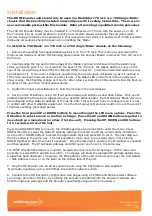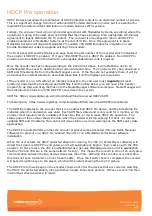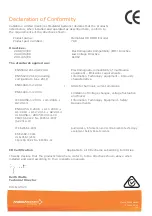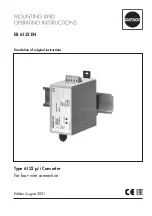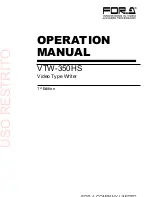
Quick Start Guide
200-2460 v1
4/8
HDCP Pro operation
HDCP Professional allows the distribution of HDCP protected content to an unlimited number of screens.
This is a significant change from the traditional HDCP limited distribution model, but it is essential for
legal HDCP protected content distribution in modern business IPTV systems.
Initially, the end user must sign a commercial agreement with MediaStar Systems, specifying where the
equipment is going to be used, and confirming that they have signed up to an appropriate commercial
agreement to legally distribute the TV content. The end user is also obliged to return all HDCP Pro
enabled equipment to MediaStar Systems at the end of its life. Once this agreement is in place,
MediaStar Systems will dispatch MediaStar Pro enabled 798 HDMI Encoders for installation or will
provide Enablement codes to upgrade existing 798 encoders.
The front panel LCD and the Status web page show the part number of the encoder which indicates if
the encoder is HDCP Pro enabled. If it says ‘798-HDCP’ then it is HDCP Pro enabled. Non HDCP Pro
encoders can be enabled in the field with a chargeable enablement code if required.
Once the encoder has been setup according to the instructions above, it will establish a link to an
authenticated time sever to determine the current date and time. The encoder will try and download a
SRM and Timestamp file from the Media Manager server. If the files are not available there, it will try
and access the internet directly to download these files from the digital-cp.com website.
If the encoder is on a LAN without an internet connection, the end user must
regularly
(at least
quarterly) download the timestamp and SRM files from the URLs below (you will need a file transfer
program to do this) and drag the files onto the Media Manager software workspace. Media Manager will
then distribute the files to all 798 HDCP Pro encoders in the system.
SRM file: https://www.digital-cp.com/sites/default/files/resources/HDCP2.SRM
Timestamp file: https://www.digital-cp.com/sites/default/files/resources/HDCPPro.timestamp
The SRM file indicates to the encoder that it is an authorized HDCP Pro device, and the timestamp file
indicates when this declaration was valid. Each SRM file is dated and is only valid for 3 months, so the
encoder must regularly receive updates of these two files, or it will cease HDCP Pro operation. The
status page of the encoder shows the date when the encoder will stop working if it does not receive
updated SRM and Timestamp files, and it will issue visible on-screen warnings as the SRM expiry date
approaches.
The HDCP Pro protected stream that the encoder produces will be allocated (through Media Manager
software) for playout on a HDCP Pro enabled 782 unit or on a MediaStar Portal Player software
installation.
When the user selects the HDCP protected stream for viewing, the 782 (or Portal Player software) will
detect the stream is HDCP Pro encrypted, and it will automatically begin a ‘login’ session with the 798
encoder. In this process, the 782 is authenticated as a genuine MediaStar device and it is established
that the 782 and 798 are in the same network ‘locality’. This means the round-trip time of an encrypted
communication between the two devices takes less than 7mS. Although this sounds a very short time,
this does not pose a problem on most modern LANs. Once the locality check is completed, the encoder
will pass decryption keys to the player, which will then start showing the live TV picture.
The HDCP Pro Info web page on the encoder shows a list of all the devices that are currently watching
the HDCP Pro protected stream, along with their locality time check periods. If these exceed 7mS then
intermittent stream access will result.


